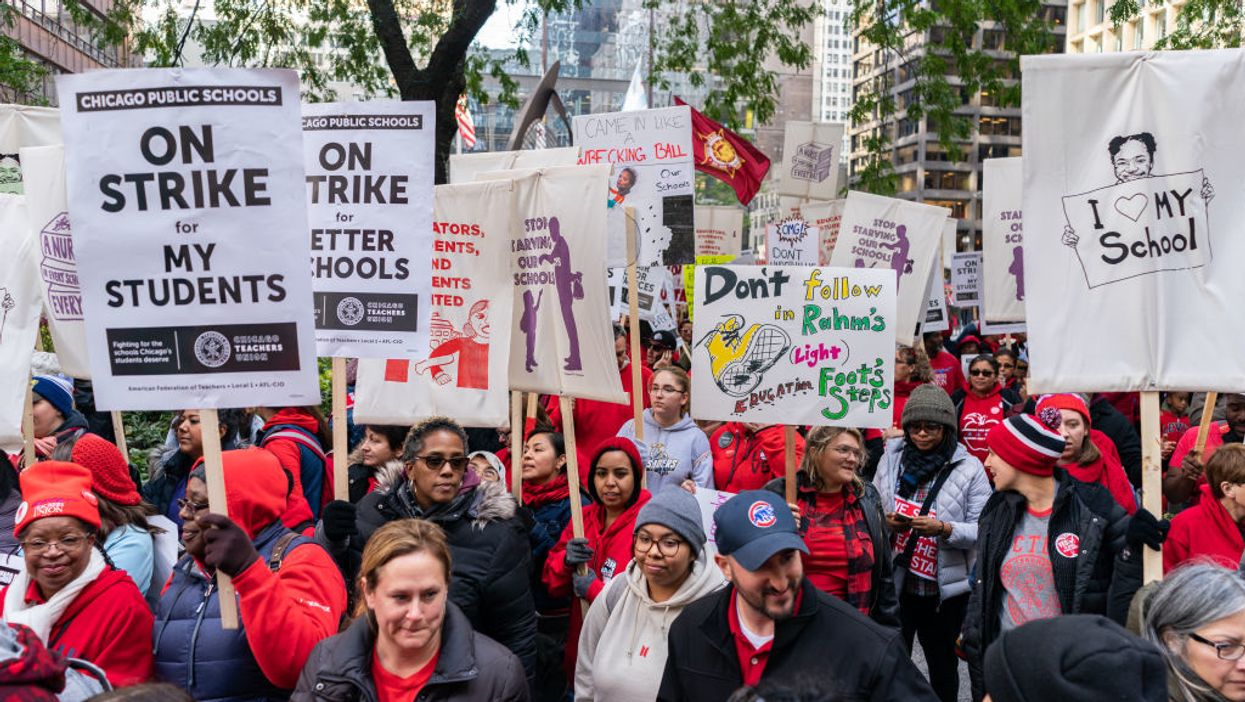
Max Herman/NurPhoto via Getty Images
Employees should not be permitted to unionize against taxpayers
At the time of the publication of this article, the Chicago Teachers Union remains on strike, although negotiations are expected to continue throughout the weekend. Classes have already been canceled for two days, forcing parents to scramble to find child care and depriving thousands of students of education days.
For a moment, forget the particulars the teachers union is complaining about — Chicago teachers are already compensated more generously than teachers from other large cities in America and the city has already offered to increase their base pay by 16 percent over the next five years. The teachers, for their part, want a 15 percent raise over three years and want additional support staff like librarians and nurses installed in schools.
The particulars, you see, don't really matter. As a conceptual matter, public employee unions shouldn't even exist.
It is one thing when employees of a private company unionize against their employer. You can debate the wisdom or necessity of such unionization all day long; based on their plummeting membership numbers, most people don't feel that unions are as necessary as they once might have been. But conceptually, any fight between employees and employers over how much employees will be paid and what kinds of benefits they will get is an appropriate fight or discussion to have.
However, the spectacle of government employees — who are, after all, subsisting on money forcibly taken from taxpayers —engaged in collective bargaining represents a gross perversion of the democratic process in a representative democracy.
In a representative democracy like we have, budgets are by law set by the voters' elected representatives in the legislature. Further, the very existence of jobs for public employees is contingent upon those jobs being created by the legislature, which defines what agencies will exist, what their budgets will be, and what their employees will be tasked with accomplishing.
If teachers or police officers or any other government employee feels that they should be paid more, the solution is simple: they should take their case to the public and argue that people should vote for legislators or city council members who support raising their wages, or the budget for their department.
That's how budgets are supposed to work in a representative democracy. Allowing public sector employees to collectively bargain with the executive branch invites wholesale dismissal of the budgetary will of the people, expressed through their elected legislatures and city councils.
Employees of private companies should be permitted to collectively bargain with their employers, if they should so choose, because what's at stake is profit. Employees of the government should not be permitted to collectively bargain with taxpayer money. Taxpayers should be entitled to make those decisions through the deliberative processes of the legislature rather than being held captive by employees who accepted a stated salary from the taxpayers and then decided after accepting that employment that it wasn't good enough.
Additionally, it is important to remember why public sector employees have jobs at all: it is because of a determination made by voters and taxpayers that they are needed to perform some vital function that cannot be performed by the private sector. If any public sector employee is performing some function that the taxpayers can live without, then their job should not exist in the first place — or at least, their job should be with some private company.
The fact that a public sector job exists at all means that the people, through their elected representatives, have determined that a certain job needs to be done, and that it is so necessary that we are willing to spend a certain amount of money that has been forcibly taken from taxpayers in order to ensure that it is done.
If a person refuses to do that job for that price, the government should be free to immediately terminate that employee and find someone who will, so that vital services do not go unperformed. However, this is difficult or impossible (and possibly illegal) when government employees are permitted to unionize.
If it is true that public education is a vital service that absolutely must be performed by government, then it should also be true that the employees who have been hired by the government to provide that service should not be permitted to walk off of those jobs without consequence as a bargaining tactic for higher wages.
Whether or not you agree that the teachers should be paid higher wages and have more support staff in the schools, we should all agree that permitting public sector employees to unionize against the taxpayers is a bad idea.
Leon Wolf
Former Managing Editor, News